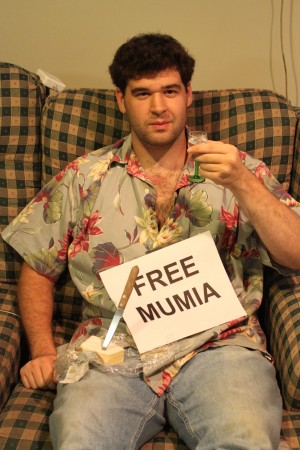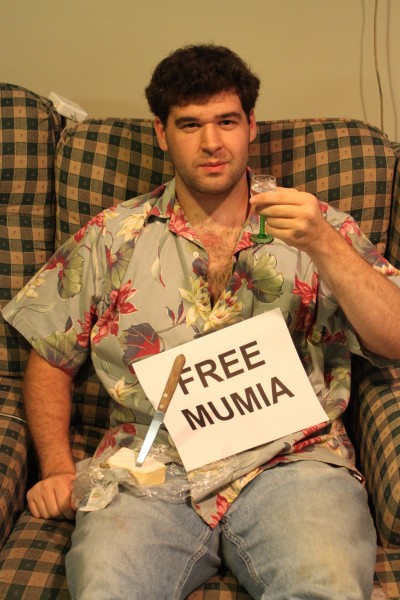It is the Friday night after the first week of classes, and Ashford Street is the inside of a drunken beehive, swarming and sticky. As the rumble and fizz of dubstep whirrs somewhere in the background, girls in tight skirts teeter about in too-high heels with their ogling and scheming male counterparts. The street seems to whisper, Give me your thirsty, your freshmen, your huddled masses yearning to get into the highlighter party…
On the corner, a small crowd has circled around a tall figure who speaks at a dot of light he holds close to his face. As I approach, I realize he is only so tall because he stands on a milk crate; the dot of light is a reading lamp. He is orating Hemingway’s The Sun Also Rises to a half befuddled, half intrigued audience.
His name is Alex Greenberg, and tonight he is the Pied Piper of Ashford.
Greenberg spouts forth words the best he can above the racket, fast and clear. He is a hundred and fourteen pages in. One girl calls out, “Why are you doing this?” Greenberg keeps reading. She asks again, and again there is no reply. Her friend turns to me and says, “Do you think he’s going to read the whole thing?”
* * *
He does. Later I speak with Greenberg in his basement apartment, dim from its lack of natural light. Here the recent Boston University graduate illuminates for me the reasons behind the antics.

As it turns out, prankster-cum-comedian Andy Kaufman, who famously read The Great Gatsby to unwilling, comedy-anticipating audiences, was Greenberg’s sideburned muse. Greenberg explains: “I mixed Kaufman with my own ideas about books and reading—the stuffiness of it all—the way there’s high literature and then there’s Friday night, and never shall the two meet. I wanted to throw both in the same bed together and see how people would react.”
And react they did. From 9:30 Friday night to 2:45 Saturday morning, Ashford’s unknowing audience exhibited a wide palette of responses. Greenberg tells me most observers ignored him; some even brusquely brushed shoulders. Another spectrum of people were interested in the show enough to convince their friends to stop for a moment, but the other members of the group would try to pull them away.
“One girl was actually dragged away by her arm by her friend,” Greenberg says. “That kind of tension was exactly what I wanted to expose.”
Other observers would politely stop and listen for ten or fifteen minutes—a chapter or so—before leaving. One man listened for three hours.
Many asked questions. “Who are you?” “Do you go here?” “Are you doing this every week?” Greenberg wanted to keep the integrity of the artistic performance intact, so he read on and left such observers in the dark . The lack of answers caused confusion and frustration—but appeared to build mystique and fuel interest.
The varied responses from passerby illustrated the success of Greenberg’s goal: to make people think about themselves and their environment. Greenberg says, “Drinking in that type of scene covers up a lot of things, like social anxiety and the pressures of school. People can be drunk on the weekends and not have to deal with what they’re up against Monday through Friday. This was an opportunity for people to investigate what was being covered up.”
This sentiment succinctly shows what sets Greenberg apart from others of the prankster persuasion—though to call him a prankster might be an insult. There’s more to it than that. Greenberg aims not toward retribution or making people look like idiots. His intent is to discover something about the way we live—to make people examine themselves, perhaps better themselves. He may be an imp, but he is a benevolent imp. “He’s got values. I admire that about him,” says longtime accomplice and friend Adam Finchler.
Greenberg approaches all of his ploys with such ideals, and Friday night was not his first ride on the social experiment pony. “In high school, a couple of friends and I dressed up like homeless people and stood out at a red light near our school, where kids drove around in cars Mommy and Daddy bought them. We got squeegees and washed windows. Out in the middle of suburban New Jersey. People loved it. They got the irony, like ‘Oh, I get it; there are no poor people here! We’ve escaped that!’ ”
Finchler was there in vagabond apparel that day. He remembers: “A lot of our friends didn’t recognize us and we freaked a lot of them out. Plenty got the joke though, and even the school cop told us he thought it was a smart joke. We used the money to buy pizza and ate it in the school’s parking lot.”
The shenanigans continued at college, when Greenberg and Finchler set up a table offering free relationship advice outside of a BU poetry show. It was an instant hit, as students crowded around and spilled their hearts to the pair. Greenberg’s hijinks often toe the line between “practical joke” and “community learning experience,” and this was no different. Finchler says, “It seemed like people really connected with the idea and with our ‘advice,’ as if the bizarre situation we created gave them some sort of outlet for their confusion. It was a joke, but it wasn’t.”
The two also put up a limbo bar directly outside the Government Center T Station at rush hour. Greenberg recalls, “We dressed like psychedelic cruise ship recreational activity coordinators—with sunglasses and leis and everything. We got a boom box, played Jock Jams on loop, and danced around holding the bar. Business people would have none of it; we thought they’d desperately want some fun, but no. The bar wasn’t even that low! It was surprising how negative the reaction was.”
Despite the unsavory vibes of some, Greenberg was inspired by those who limboed. “People always react differently than I think they will. For some reason, I always come in with a negative attitude and expect the worst, but by the time I’m walking home, I’m always thinking about how great people are.”
He’s come a long way from the middle school lad who set his AOL Instant Messenger profile as a continuous stream of the letter “A,” just to see what people would do. “People freaked out,” Greenberg says.
So what’s next for BU’s Sir John Hargrave in-the-making? Currently, Greenberg is in transition. After graduating in May with a degree in English and a minor in Geography, Greenberg has been keeping busy working at the deli counter of a local grocery store. The work, if not mentally stimulating, is at the very least self-sustaining—Greenberg has achieved financial independence from his parents despite the difficult economy.
And though he has yet to embark on a fully-fledged career, Greenberg is enjoying life. He’s read 40 books since graduating and plans to travel in the near future. As for the distant horizon, Greenberg says, “In ten years I see myself eating a little better. I’m considering law school.” Not only has Greenberg stopped to smell the roses—he’s set up a tent next to the flower garden.
Will the experiments continue? Yes—but you didn’t hear it from me. Says Finchler, “At the end of the day, doing these performances, pranks, or whatever is exhilarating—not simply because of the rush of performing—but because challenging people’s expectations about what will happen when they walk down the street to get a bagel is a genuinely powerful feeling.”
And Greenberg has more to figure out about the world in which we live, despite the physical toll his exploits sometimes cause. Though he was “stone-cold sober” during his book-reading, Greenberg woke up the next day with a hangover: “I was out of it the whole next day, and I had a lump in my throat the size of a softball. I had to cancel all my plans.” Drinking may kill brain cells, but examining humanity has its downfalls too.

